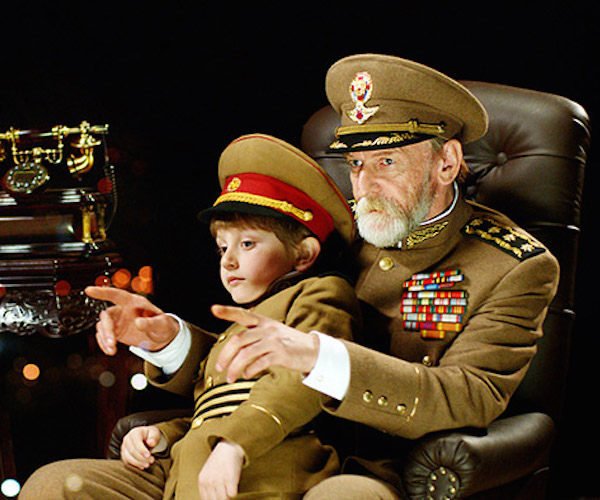Film Review: “The President” — Saving the Soul of a Monster
The President doesn’t try to drum up easy sympathy for its arrogant anti-hero; it is content to simply show the physical and emotional journey the two share.
The President, directed by Mohsen Makmalbaf. At the Museum of Fine Arts, Boston, MA, on January 24.

Misha Gomiashvili and Dachi Orvelashvili in a scene in “The President.”
By Paul Dervis
Iranian-born writer/director Mohsen Makhmalbaf’s The President won Best Feature at the Chicago International Film Festival and was nominated for Best Film at the London Film Festival. It also won the Audience Award at Tokyo’s FILMeX and was again nominated for Best Film in Venice. The film is good enough to deserve those and other accolades. The President feels Like an homage to early Costa-Gavras films, such as Z; the compelling narrative skillfully mixes an examination of political power with a tale of personal redemption.
Misha Gomiashvili plays a nameless country’s (somewhere in the Caucasus) cruel dictator, referred to as ‘Your Majesty.’
The nation is in crisis and, a contemporary Nero, the ruler is playing the proverbial fiddle as the capital burns. There’s rioting in the streets but the President sits in his palace with his young grandson sitting on his lap, writing death sentences for captured militants. In an early, haunting scene, he tells the child (who is clad in a fascist uniform identical to the tyrant’s), that he can turn off all the lights in the city with a simple phone call….and he does it. Calls again; lights go on. The child wants to try that trick and ‘Your Majesty’ lets him. People are dying in the streets and the two play a nasty little God-like game. Lights off, lights on. lights off, lights on.
Until the lights won’t go back on again.
The revolt has started.
The revolutionaries have captured the dictator’s son and daughter-in-law and killed them. But this doesn’t seem to faze the President. But now the palace itself is under siege; it is time for him and his family to escape. At the airport, the ruler’s wife and other family members are boarding the jet that will whisk them away. But the child wanted to stay with his grandfather at the palace, and the arrogance of the dictator got the best of him. He let the boy stay, and now traveling to the waiting jet has become impossible. They flee.
The pair escape the mob stoning their car, but they are on the lam, an entire nation after them. They steal a motorcycle at gunpoint and then make a poor barber shave the dictator’s head, who then puts on a peasant’s clothes and a filthy wig. The odd couple then disappear into the poverty of the rural landscape.
For the next hour of the film, they encounter the cruelty of the soldiers who had recently obeyed the President’s every whim and the pathos of the people he had victimized. Through it all the grandson believes that they are playing an amusing game. Dachi Orvelashvili plays the boy with such wide-eyed innocence and perpetually refreshed wonder that he becomes a means of creating empathy: hatred for the inhumane President turns into sadness for the plight of the two fugitives.
In the course of their journey, the President slowly sees the error of his callous, brutal, and self-indulgent manipulation of total power, His remorse becomes palpable. At one point he carries on his back a political dissident who had been imprisoned and tortured (his feet are maimed). The President is taking the man to his home, to see his wife for the first time since his captivity. Along the way the man claims to be one of the rebels that murdered the President’s son. The old man dreams of revenge, but he continues on to the wife’s home. But it is too late for reconciliation, and the journey ends tragically.
All the while the child continues to believe that they are having fun. He is too young and sheltered to absorb what is happening, to take in the horror and chaos around hm. It is the old man’s obvious love for the boy, and his growing regret for his past actions, that bring him to a form of spiritual salvation by finally seeing how savagely he has shaped reality .. or at least that is one interpretation.
The President doesn’t try to drum up easy sympathy for its arrogant anti-hero; it is content to simply show the whirlwind physical and emotional journey the two share. The experience is not only moving but ironically inspiring: can there even be hope for the soul of a monster?
“Amazing Grace”: “…once was lost, but now am found. Was blind, but now I see.”
Paul Dervis has been teaching drama in Canada at Algonquin College as well as the theatre conservatory Ottawa School of Speech & Drama for the past 15 years. Previously he ran theatre companies in Boston, New York, and Montreal. He has directed over 150 stage productions, receiving two dozen awards for his work. Paul has also directed six films, the most recent being 2011’s The Righteous Tithe.
Tagged: Dachi Orvelashvili, Iranian Film Festival, Misha Gomiashvili, Mohsen Makhmalbaf, Museum of Fine Arts Film, Paul Dervis

